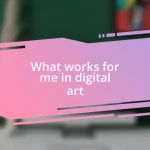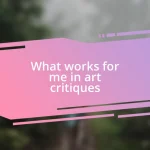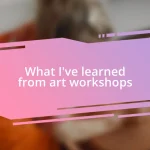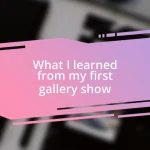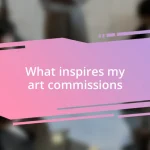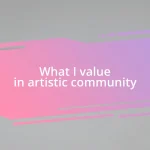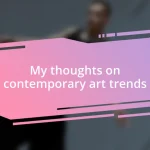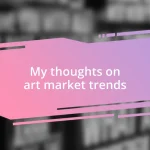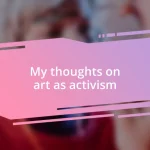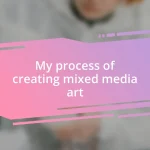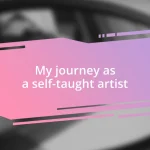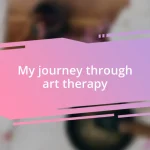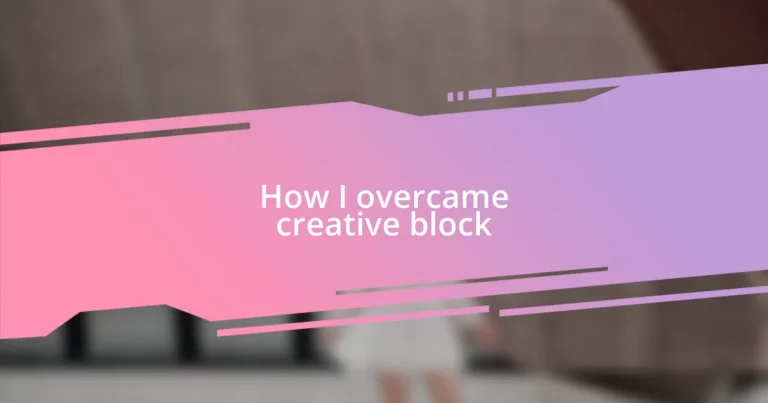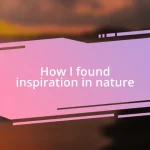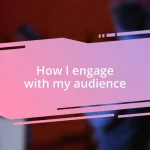Key takeaways:
- Creative block often arises from self-doubt, perfectionism, burnout, and external pressures; acknowledging these triggers is crucial for overcoming it.
- Effective strategies to combat creative block include free writing, changing environments, collaboration, mindfulness, and playful exploration.
- Overcoming creative block fosters resilience, ignites fresh insights, and enhances overall creativity, ultimately leading to a more fulfilling artistic journey.
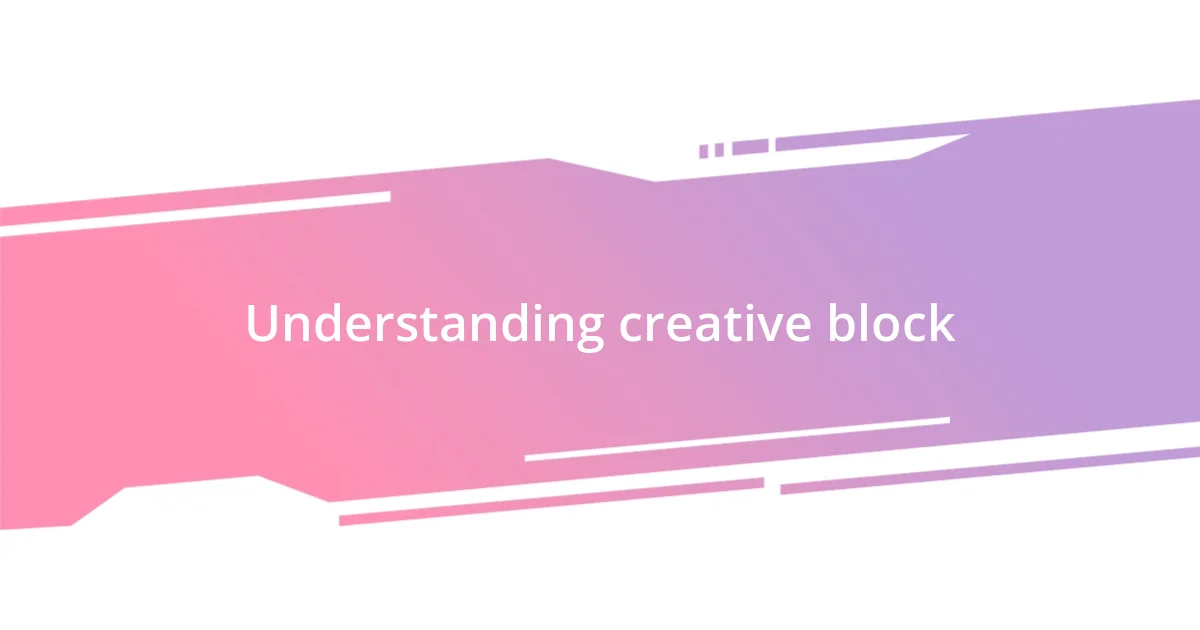
Understanding creative block
Creative block can feel like an insurmountable wall, leaving you frustrated and wondering if inspiration has abandoned you for good. I remember sitting at my desk, staring at a blank page, heart racing, and thoughts swirling. It dawned on me: was I truly out of ideas, or was I simply paralyzed by the pressure to create something perfect?
This block is often rooted in self-doubt and fear. I’ve found that when I place undue expectations on myself, creativity dries up like a forgotten well. Have you experienced that feeling, too? The deeper I dug into these emotions, the more I realized that acknowledging these fears is the first step to overcoming them.
Understanding that creative block is a common experience allowed me to approach it with compassion rather than frustration. Everyone, from seasoned artists to aspiring creators, faces this challenge, and recognizing that I’m not alone helped ease the weight I felt. I began to ask myself, “What if this moment of stillness is just a part of my creative journey?” Embracing that question opened a door for new ideas to flow in.
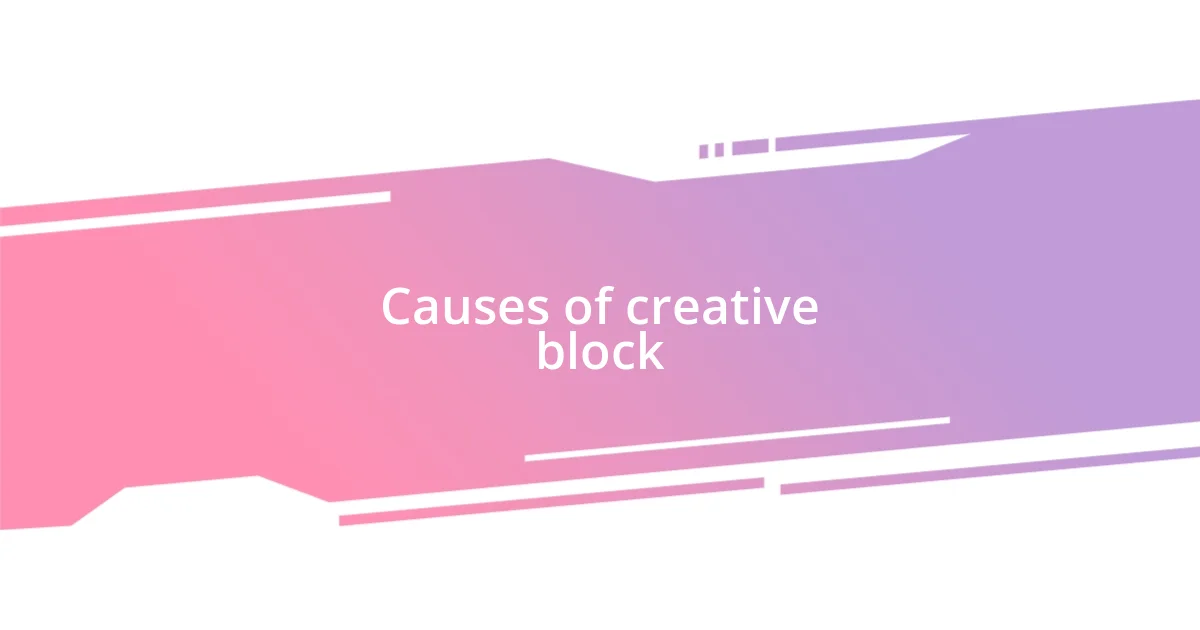
Causes of creative block
Creative block can stem from various sources, and I’ve encountered a few that really stand out. Sometimes, these blocks emerge from overwhelming stress or life changes. For instance, during a particularly chaotic period in my life, I noticed that the constant murmur of anxiety had a tangible effect on my creativity. It felt like trying to swim through mud—every stroke was slowed down by the heaviness surrounding me.
Here are some common causes of creative block:
- Perfectionism: The fear of not meeting high standards can stifle creativity.
- Self-Criticism: Harsh inner dialogue discourages risk-taking and experimentation.
- Burnout: Exhaustion can cloud inspiration, leaving you feeling drained.
- External Pressure: Deadlines and expectations from others can create anxiety that blocks creative flow.
- Life Changes: Major transitions, such as moving or changes in personal relationships, may disrupt routine and creativity.
- Fear of Judgment: Worrying about others’ opinions can prevent you from expressing authentic ideas.
Reflecting on these causes has helped me identify my own triggers. By doing so, I could address them head-on and find healthier ways to navigate through that creative slump. It’s enlightening to realize that sometimes, the external factors we face can not only affect our mental state but also directly impact our creative output.
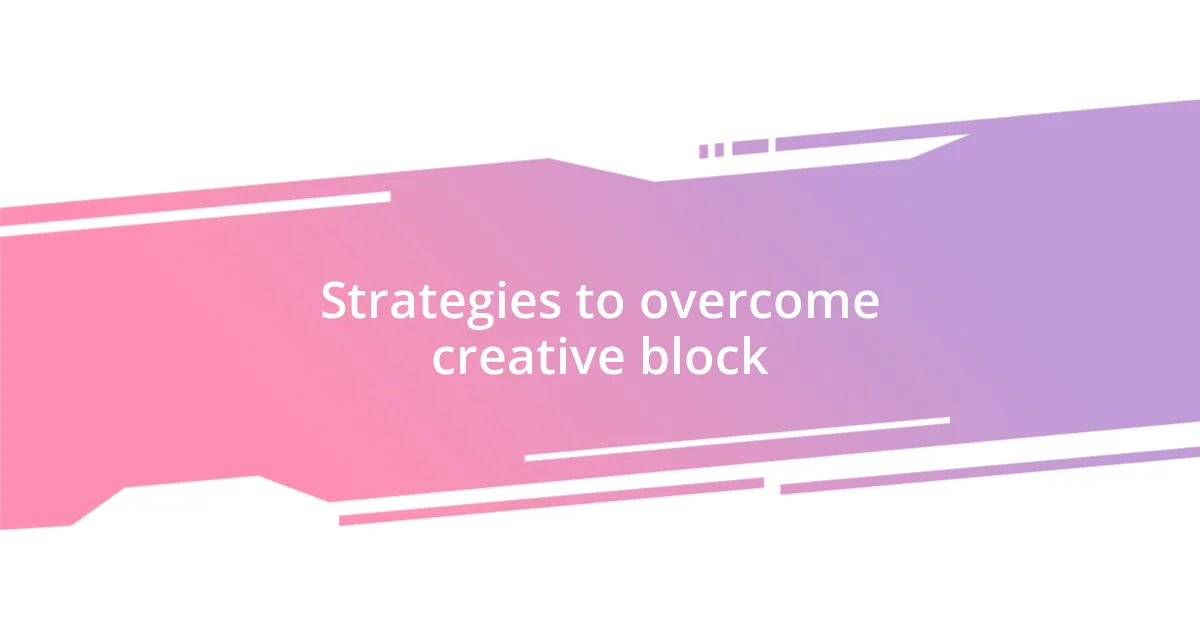
Strategies to overcome creative block
One of the most effective strategies I’ve discovered is setting aside dedicated time for free writing. I often use a timer and allow myself to write without any judgment or concern for quality. This practice creates a safe space for my mind to wander uninhibited, and surprisingly, some of my best ideas emerge when I stop trying to force a particular outcome. Have you ever tried this? The key is to silence that inner critic and just let the words flow.
Another approach involves changing my environment. A simple walk outside or relocating to a café can shake up my thought patterns. I vividly recall a day when sitting at my favorite park bench sparked an idea for a project I had been stuck on for weeks. The fresh air and shifting scenery allowed my brain to reset, kicking my creativity back into gear. It’s fascinating how a change of perspective can influence your creative process!
Lastly, I often find inspiration in collaboration. Engaging with fellow creatives can inject new energy into my work. Once, I joined a small group of artists to brainstorm ideas, and the synergy in that room was electric. Everyone brought unique viewpoints that reshaped my understanding of my project, ultimately breaking through the block I faced. Connecting with others not only enhances creativity but also reminds us we’re part of a larger community.
| Strategy | Description |
|---|---|
| Free Writing | Set a timer and write without self-judgment to release ideas. |
| Changing Environment | Shift your physical space to gain fresh perspectives and inspiration. |
| Collaboration | Engage with others to spark new ideas and boost creativity. |
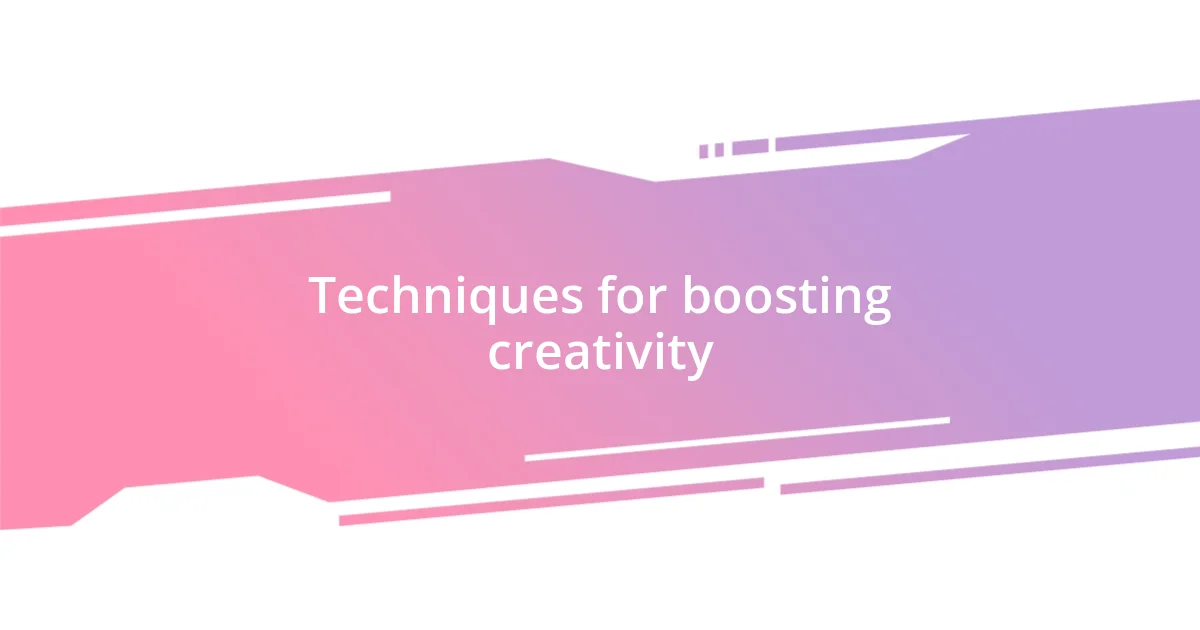
Techniques for boosting creativity
One technique that has truly helped me is the practice of mindfulness. I remember a time when my mind was racing with a million thoughts, making it nearly impossible to focus. By taking just a few minutes each day to meditate or practice deep breathing, I found that I could clear away the mental clutter. It’s amazing how grounding myself can open up pathways for creativity that I didn’t even know were there—how often do you take a moment to just breathe?
I also swear by the power of playful exploration. Whenever I notice my creative juices drying up, I indulge in activities that are entirely unrelated to my main work—like doodling or trying my hand at cooking a new recipe. One time, while experimenting with a batch of homemade pasta, something about the rhythm of kneading the dough sparked a whole series of ideas for my art project. Sometimes spontaneity can lead you to unexpected solutions, don’t you think?
Moreover, I make it a habit to keep an inspiration journal. Whenever an idea strikes, or even when I’m feeling a bit lost, I jot down thoughts, quotes, or snippets of conversation that catch my attention. One evening, while sitting in a coffee shop, I overheard a fascinating discussion that made its way into my journal and later became a story I wrote. It’s this ongoing collection of moments that serves as a reservoir of inspiration. If you were to start such a journal today, what unique experiences could you capture for future creativity?
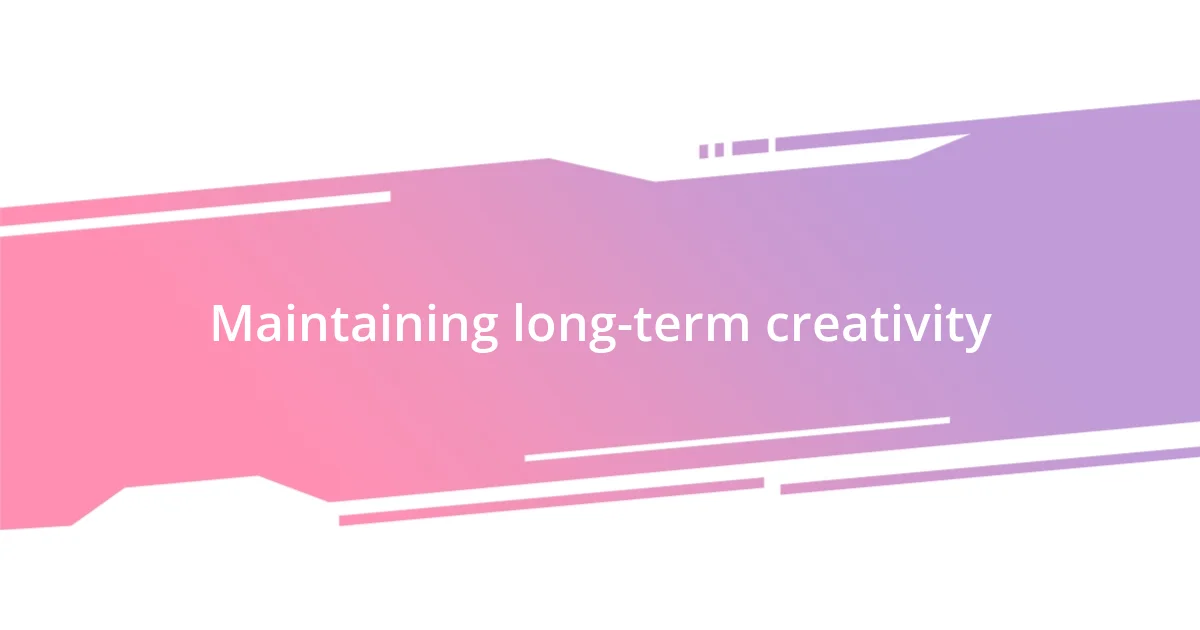
Maintaining long-term creativity
Maintaining long-term creativity isn’t just about having bursts of inspiration; it’s about nurturing a lifestyle that fosters innovation daily. I’ve found that developing a consistent routine can really help. For instance, I set aside a few mornings each week solely for creative exploration. During these sessions, I commit to experimenting with different mediums or styles without any pressure to produce something “good.” This practice has become a wellspring for new ideas that feed into my longer-term projects.
Another strategy I’ve embraced is the importance of taking breaks. I’ve observed that stepping away from my work—even if just for a few minutes—can provide the mental reset I need. One particularly hectic day, I decided to bake cookies during lunch instead of drowning in my to-do list. The simple act of measuring ingredients and watching the dough rise cleared my mind, leading to a wave of creativity when I returned to my desk. How often do we overlook the benefits of a brief pause?
Furthermore, I’ve discovered that tracking my creative progress helps maintain motivation. I keep a visible log of completed projects and ideas, which I update regularly. There’s a special thrill in seeing my creative journey laid out in front of me. Once, flipping through my journal, I stumbled upon an idea I had jotted down months ago that felt relevant again. It’s like having a treasure map for my creativity, reminding me of the treasure trove of possibilities that exists whenever I need to reignite my passion. What might your own creative log reveal about your journey?
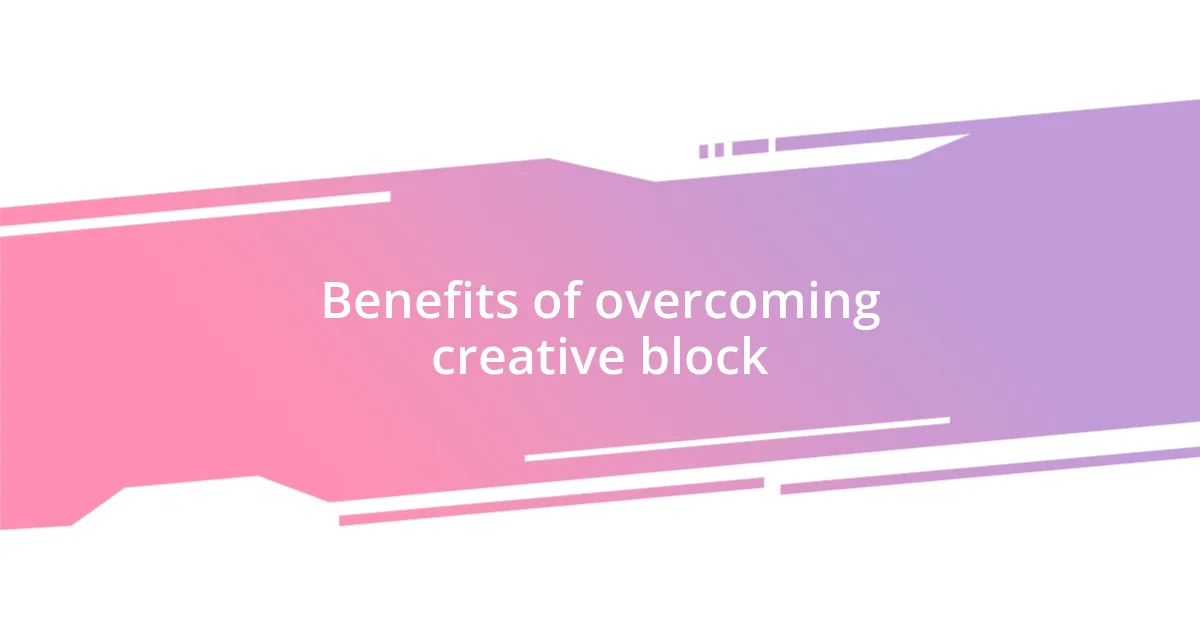
Benefits of overcoming creative block
Overcoming creative block can lead to an incredible sense of liberation. I remember a particularly stagnant period in my creative journey when I felt trapped in a cycle of self-doubt. The moment I broke through that barrier, it felt as if a heavy weight was lifted from my shoulders. The freedom to explore ideas without judgment reignited my passion and enthusiasm. Have you ever felt that exhilarating rush when you finally let go and let your imagination roam?
Another significant benefit of overcoming creative block is that it cultivates resilience. I once faced a tough deadline that left me paralyzed by the pressure to perform. Instead of succumbing to anxiety, I learned to embrace the challenge and adapt my approach. This experience taught me that creativity isn’t just about spontaneous ideas—it’s also about pushing through adversity. How does facing your creative hurdles make you feel more robust in your craft?
Moreover, breaking through creative block opens doors to fresh insights and new perspectives. I vividly recall a time after a creative lull when a simple walk through my neighborhood transformed my outlook. The vibrant colors of the flowers and the laughter of children playing ignited new concepts in my mind. This experience reminded me that inspiration is often closer than we think; we just need to clear the fog first. Think back—when was the last time a brief change of scenery sparked a rush of creativity for you?
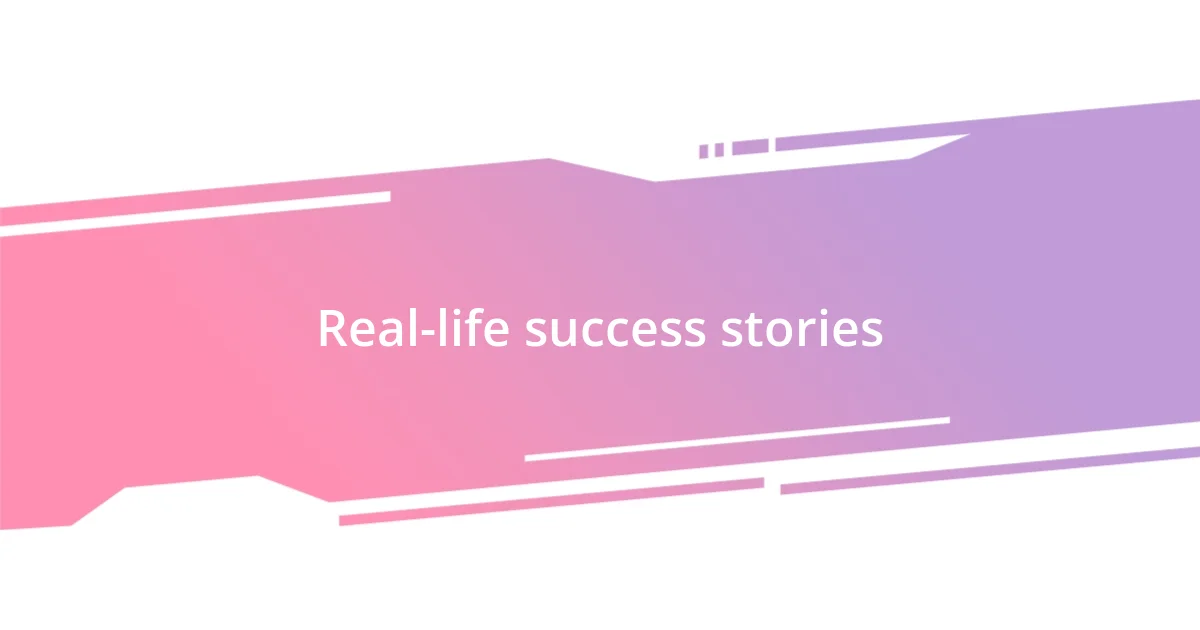
Real-life success stories
I’ve often turned to the stories of others when I’m looking for inspiration, and one that stands out to me is from a fellow artist who faced a severe creative block after a burnout. They shared how taking a month-long retreat in nature allowed their ideas to flow freely again. Nature had a way of stripping away the noise, revealing a clarity that had been buried beneath the chaos. Have you ever found a change of environment reignite your creativity?
Another powerful narrative comes from a writer who struggled for years with imposter syndrome. After submitting their first manuscript—which they had convinced themselves was utterly terrible—they received an unexpected acceptance. The exhilaration of that moment transformed their self-doubt into determination. It’s fascinating how a single act of courage can propel us forward. I wonder, what risks have you taken that changed your creative trajectory?
A musician I know faced a tough spot after a disappointing performance. Instead of retreating in embarrassment, they turned their experience into a series of songs that inspired others with similar feelings of failure. This brave choice not only healed their own wounds but also resonated with fans around the world. Isn’t it amazing how vulnerability can lead to profound connection in the creative space?
